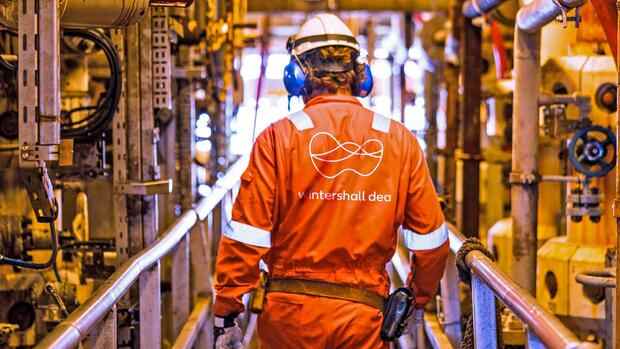The company is regarded as the most important German partner of the Russian state-owned company Gazprom.
(Photo: Wintershall Dea)
Dusseldorf The Kassel-based company Wintershall Dea actually only wanted to present its annual figures on Thursday. Now the focus is on the Russian business of the German gas company, which is putting the company under pressure. In a call to investors, Wintershall surprisingly refused any statements on the current situation. A planned press conference for noon was cancelled.
Instead, there was a written statement from Wintershall CEO Mario Mehren: He was shocked by what was currently happening in Ukraine. “The latest military escalation is also shaking up the economic cooperation between Russia and Europe that has been built up over decades and will have far-reaching consequences,” the company said.
Wintershall is considered the most important German partner of the Russian state-owned company Gazprom. Both companies each hold 50 percent of the joint venture Achimgaz, which produces gas in Siberia.
In addition, the Russian billionaire Mikhail Fridman owns 27 percent of the shares in the company through the holding company LetterOne (L1). It was last thought that Wintershall Dea would go public independently. But in financial circles it is now firmly assumed that an IPO will definitely not come in the foreseeable future.
Top jobs of the day
Find the best jobs now and
be notified by email.
In view of Russia’s war against neighboring Ukraine, Wintershall is not the only one in need of explanations. The Düsseldorf-based energy group Uniper and the Austrian OMV Group are also closely linked to Russia through their natural gas businesses.
All three companies are financial partners for the Nord Stream 2 pipeline project, which has been halted for the time being, have business partnerships with Gazprom and, in some cases, generate millions with shares in production projects in Siberia.
The Russia Risk
So far, this partnership has paid off well. At Wintershall alone, business in Russia contributed 19 percent to the operating profit (Ebitdax) last year. The gas prices, which have been rising for months, have also given the group a jump in profits of a whopping 387 percent. The situation is similar at OMV and Uniper.
However, the losses that companies are now threatened with as a result of the war between Ukraine and Russia are no longer proportionate to this. Uniper alone has invested almost one billion euros in the construction of Nord Stream 2. A total of five Western companies (Uniper, Wintershall, OMV, Shell and Engie) have invested in the joint Baltic Sea pipeline with Gazprom. The Russian state-owned company assumed 50 percent of the costs, the remaining companies each around ten percent.
CEO Klaus-Dieter Maubach announced on Wednesday when the annual figures were presented that it was first necessary to evaluate what a final stop to the project would mean for the former Eon subsidiary Uniper.
A throttling of Russian gas supplies or even a total failure would also hit Uniper hard. The company needs the gas to operate its power plants and, in the future, also to fill its gas storage facilities and trade with it. The Düsseldorf energy group is one of the largest gas traders in Europe.
Uniper and OMV – share prices crash
In view of the Russian troops’ invasion of Ukraine, Uniper said on Thursday: “We are deeply concerned about the escalation of the situation as a result of Russia’s attack on Ukraine.” It also said: “In this situation, our full attention is given to our employees and customers. It is our task to secure the energy supply, our customers depend on us for the supply of electricity, gas and heat. This is also the case in Russia.” The shares of the Dax group have been in free fall since Thursday morning. In the past four weeks, the price has fallen by more than 25 percent.
The Viennese energy company OMV is also dependent on good business relations with Gazprom. Around a quarter of all OMV gas production currently comes from Russia. To this end, billions in investments flow from Vienna to Moscow.
>> Read here: That’s how important the Ukrainian pipelines are for Russian gas supplies
At 730 million euros, Nord Stream 2 is not even the largest investment. It was only in 2017 that the gas company invested 1.75 billion euros in a stake in the Yuzhno Russkoye gas field in Siberia. The decision on another deal with Gazprom is still pending. OMV actually wanted to secure 25 percent of the Siberian gas field Urengoy for 905 million euros.
As the Viennese newspaper “Kurier” reported, the Austrians are now considering abandoning the project. OMV did not want to comment on these rumors when asked. A final decision on this will be announced when the new strategy is presented in mid-March. The group’s shares lost 11 percent on Thursday.
In addition to domestic oil and gas production, OMV relies heavily on Russia.
(Photo: dpa)
“OMV has a crisis management team that continuously analyzes and evaluates the situation in order to be able to take appropriate measures if necessary,” said a spokesman for the company at the request of the Handelsblatt. According to the contracts with Gazprom, the gas supply has so far continued.
As far as investments in Nord Stream 2 are concerned, the Austrians were also confident. CEO Alfred Stern recently said that the first loan repayments had already been received last year. There is currently no reason for a write-off. Wintershall also assumes that the project company will be compensated if the pipeline is prevented.
Nevertheless, the energy companies clearly have a hard time criticizing Russia. Just a few days ago, Wintershall CEO Mehren even warned of Western economic sanctions against Russia.
More: Electricity, gas, oil: Industry fears the next price shock because of the Ukraine crisis


